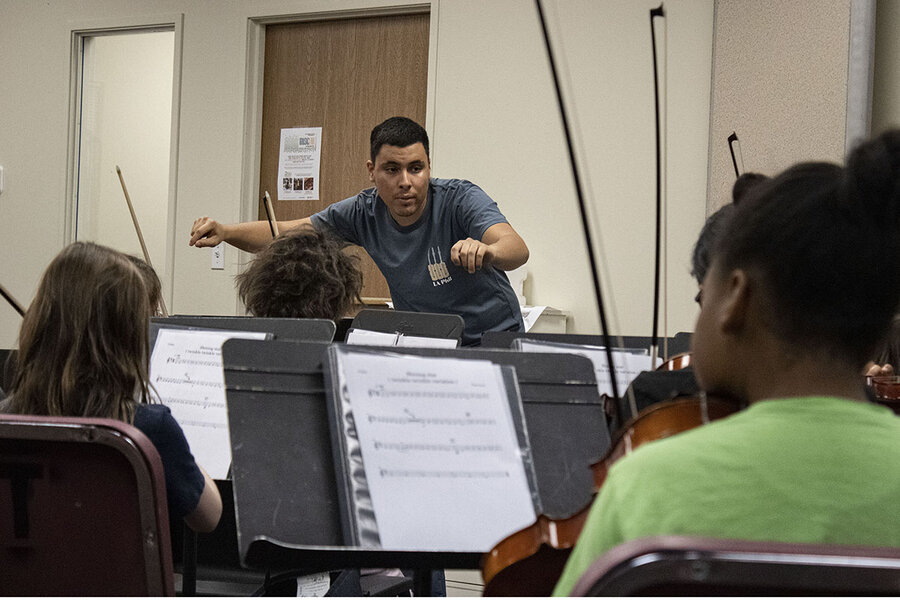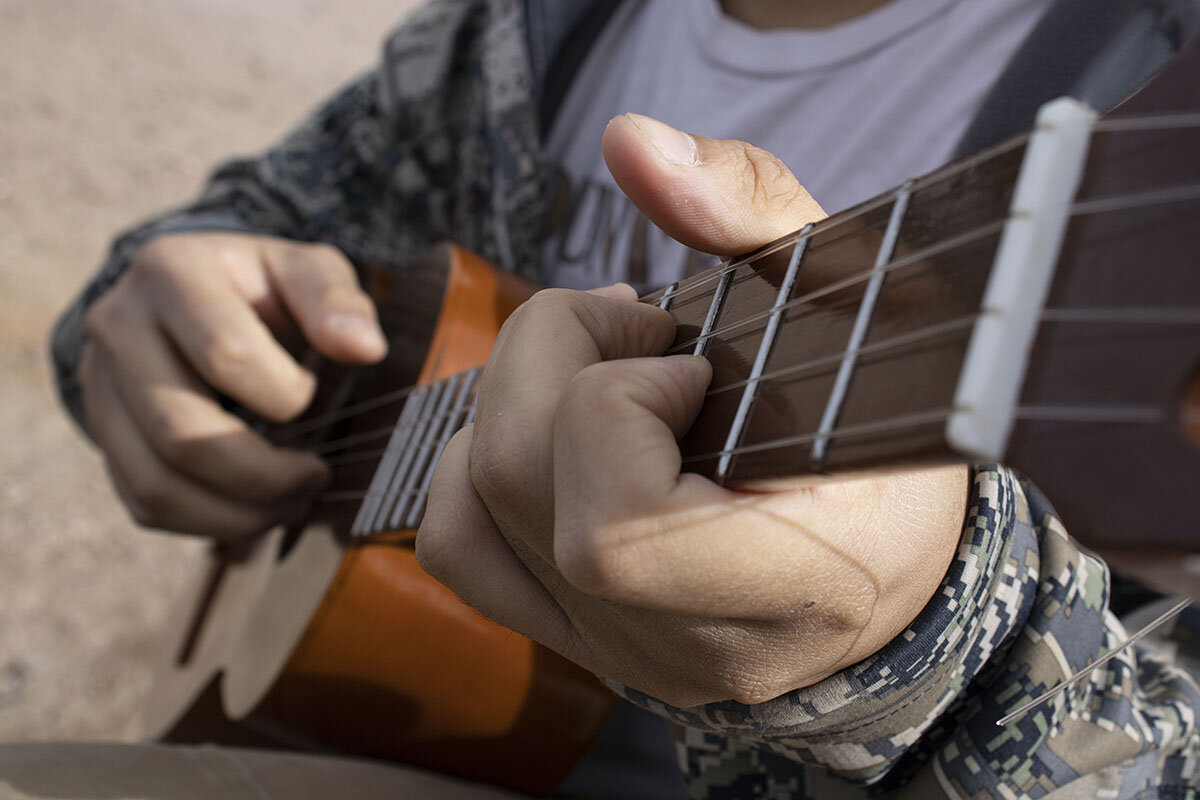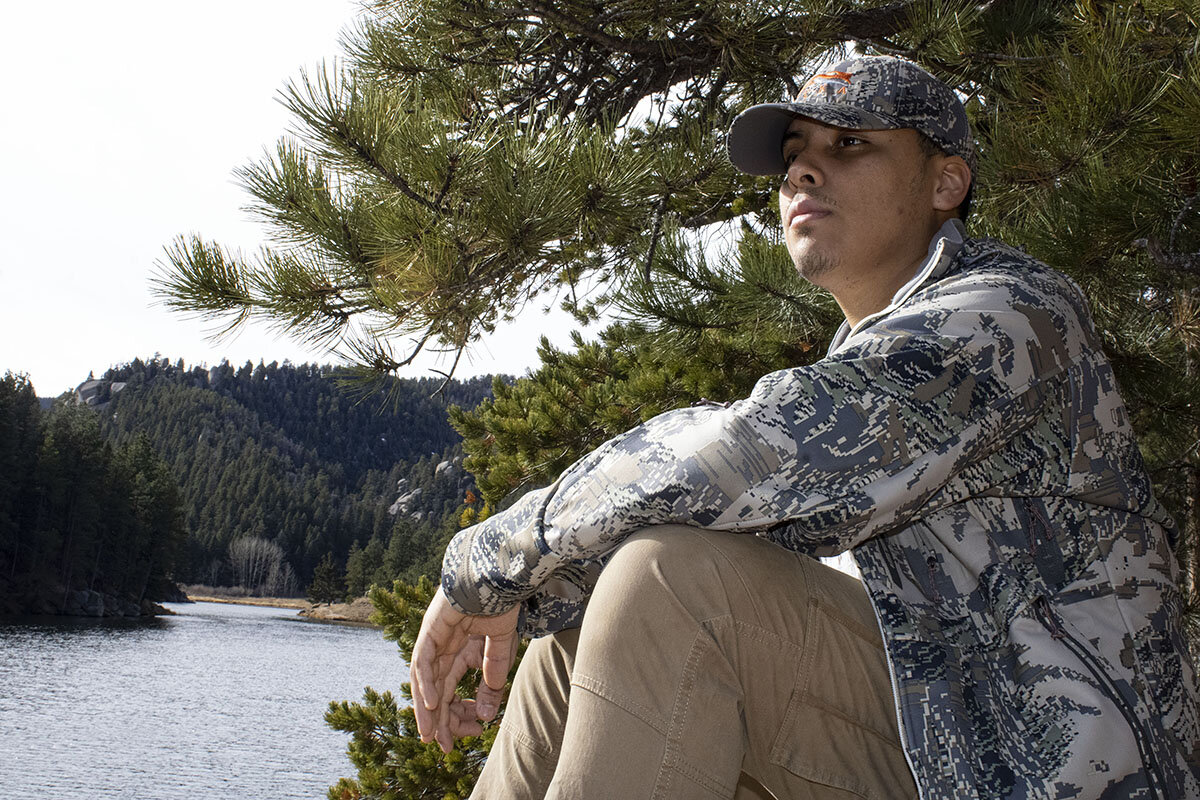‘My second home.’ Teaching music helps asylum-seeker hit a rhythm.
Loading...
| Denver
A few dozen children in Denver settle into seats, violins and violas in hand. With short cropped hair and a focused gaze, Nixon Garcia observes from off to one side.
This is a fall show-and-tell for parents at El Sistema Colorado, a free music school that prioritizes kids from low-income families. The Denver program was inspired by the original El Sistema in Venezuela, which since its founding in 1975 has sparked similar projects around the world.
Why We Wrote This
A Venezuelan conductor finds purpose through teaching at a music school in Denver. The school has ties to a program that was instrumental to his musical education growing up.
With flicks of his wrists, the 22-year-old Mr. Garcia conjures up simple songs that he learned as a boy in Venezuela. He’s brought that same sheet music to students in the United States, along with hopes for asylum. Working at the Colorado program, he’s come full circle.
“El Sistema has been my second home throughout my whole life,” says Mr. Garcia.
The teaching artist is a “positive light” at the music school, says Ingrid Larragoity-Martin, executive director of El Sistema Colorado. “He’s passionate about kids, and he knows how to work with them.”
Mr. Garcia came to the U.S. in 2022 to escape violence at home, he says, including three kidnapping attempts. He’s received work authorization, allowing him to work legally while his asylum case moves forward.
Listen to the full story, read by the author
A few dozen children in Denver settle into seats, violins and violas in hand. With short cropped hair and a focused gaze, Nixon Garcia observes from off to one side.
“Awesome,” the teacher murmurs at the sound of tuning strings.
Why We Wrote This
A Venezuelan conductor finds purpose through teaching at a music school in Denver. The school has ties to a program that was instrumental to his musical education growing up.
This is a fall show-and-tell for parents at El Sistema Colorado, a free music school that prioritizes kids from low-income families. The Denver program was inspired by the original El Sistema in Venezuela, which since its founding in 1975 has sparked similar projects around the world.
“I feel really proud of them,” Mr. Garcia says of his orchestra.
With flutters of his hands and flicks of his wrists, the 22-year-old conjures up simple songs that he learned as a boy in the Venezuelan program. He’s brought that same sheet music to students in the United States, along with hopes for asylum. Working as a teaching artist at the Colorado program, he’s come full circle.
“El Sistema has been my second home throughout my whole life,” says Mr. Garcia, who teaches in Spanish and English.
The original program’s catchphrase, “tocar y luchar” – or “play and fight” in English – has evolved into a personal mantra of perseverance for the young conductor who can’t imagine returning home.
By the time he left Venezuela, in 2022, says Mr. Garcia, he’d been kidnapped three times.
Love of country
Backdropped by mountains in northwest Venezuela, the town of La Fría sits near the Colombian border. Mr. Garcia’s family, who ran a poultry farm there, enrolled their son in the popular music program at a young age.
In La Fría, says Mr. Garcia, “if you don’t play soccer, you probably play music.”
At age 5, he began learning the Venezuelan cuatro, which has four strings. Later on came the clarinet. As a teenager, Mr. Garcia began teaching other El Sistema students – a key mentorship feature of the program – and developed a love of conducting. But basic needs were stark; some students he taught sat on the floor, because there weren’t enough chairs. And beyond the solace of class, violence lurked.
When he was a young teenager, in 2015, a criminal group, called a colectivo, kidnapped him and his family at a gas station. The group held them for several hours, his family says, and demanded thousands of dollars for their release.
Venezuela, meanwhile, devolved into further economic, political, and human rights crises under President Nicolás Maduro, causing millions to flee. Mr. Garcia began attending pro-democracy protests in his El Sistema jacket, emblazoned with the stripes of the country’s flag. Inspired by a young violinist – an El Sistema alum who went viral for playing at protests – Mr. Garcia took to the streets with his own cuatro, singing the national anthem.
“You can see how everything is terrible. But in the end, you still love your country,” he says. “You don’t want to leave.”
He continued to teach and conduct, and helped prepare Venezuela to win the title of the Guinness World Record’s largest orchestra in 2021. Still, threats against his family had continued. Mr. Garcia was captured again by an insurgent group on his family farm in La Fría. Yet neither was he safe at college in another city, Mérida, where he studied engineering. A few days after appearing at a protest, Mr. Garcia says he was ordered, with a gun to his head, by men in motorcycle helmets to get into a car. He recalls the men stealing his phone, which he had used to take photos of the protest.
Although his family had arranged private security for him in La Fría, they decided that he had to leave.
“When you get private security, you know that you could die any day,” he says.
A tourist visa that his family had secured some years prior still hadn’t expired. That became his ticket to the U.S. last year. Yet even as he moved into his cousin’s home in Monument, Colorado, an hour south of Denver, the adjustment was isolating. Unable to speak English at first, Mr. Garcia recalls wondering at two hospitals – where he went for what felt like panic attacks – if he would die, as staff failed to understand him.
A family member suggested he retreat to nature, take a moment to breathe. A prayerful hike in the nearby mountains, Mr. Garcia says, helped right his course.
Inspiration struck, tuning-fork clear: Why not return to music?
A Google search for nearby orchestras yielded a name he knew.
The young conductor, in awe, reached out to El Sistema Colorado.
From volunteer to teaching artist
On a recent Friday evening, at orchestra rehearsal, Mr. Garcia introduces students to his new arrangement of “Twinkle, Twinkle, Little Star.”
Let’s try playing it softer, he says, “like drops of water.”
The children do play it soft. Shy, even. They repeat the pizzicato – plucking their strings – and the sound swells like soft rain.
Mr. Garcia started out as a volunteer at El Sistema Colorado before the federal government issued the asylum-seeker his work authorization. That allows him to work legally while his asylum case moves forward. Now paid, he teaches groups of strings-learning students in an orchestra group called Allegro.
The teaching artist is a “positive light,” at the music school, says Ingrid Larragoity-Martin, executive director of El Sistema Colorado. “He’s passionate about kids, and he knows how to work with them.” She says other students at the music school, from Venezuela and beyond, had participated in El Sistema programs prior to coming here.
Staying behind after class, Mr. Garcia switches to Spanish to coach a cellist to whom he assigned a solo. He says he’d meant to add a flourish, a glissando, before printing out the page. As she practices, he taps along the measures with a pencil, coaxing out the melody he’d heard in his head.
Mr. Garcia’s parents, meanwhile, encourage him from a neighboring state. Also asylum-seekers, they’ve settled in Utah and speak with their son every day.
We hope that he “continues to develop in his musical world, and becomes the orchestra director that he's always dreamed of being,” says his father, Gilbert Garcia, in Spanish.
Active rest
The conductor hikes the next day, a trail near Monument, where his epiphany emerged months before. The woods here have a rhythm of their own.
Crosshatches of dry pine needles crunch underfoot. A bird calls out above. He skips a rock across a lake that laps a grassy bank.
In Venezuela, Mr. Garcia explains on the trail, music students had a quirky way to count sixteenth notes aloud – a way to practice steady, rapid beats.
“Ca-ra-o-ta, ca-ra-o-ta, ca-ra-o-ta,” he says to demonstrate. (In Spanish, caraota means “bean.”)
With students in Denver, he continues the tradition – with a local twist.
“Co-lo-ra-do, Co-lo-ra-do, Co-lo-ra-do,” is what they say now.
To the teacher, the state’s begun to feel like home. He dreams of coordinating a performance between El Sistema students in Venezuela and his own pupils here.
Meanwhile, he awaits the outcome of his asylum application, which may take years. Mr. Garcia says he wants to “work, make a life, and try to share as many things as we can from our country.”
Though he feels less anxiety these days, he says, sometimes it tries to sneak back in. When that happens, he takes a beat to remember all the good he has.
“You have the orchestra,” he tells himself.










